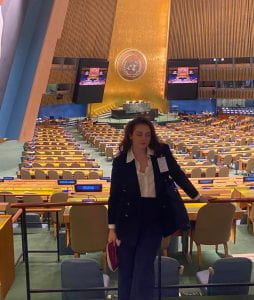The following reflection is from Jane Ilona Ressa ’24, a Pace University undergraduate who participated in the POL297L Global Politics of Disarmament and Arms Control class in Fall 2023. Students had the opportunity to engage in civic engagement assignments with disarmament advocacy efforts in the context of the UN General Assembly First Committee (Disarmament and International Security) meetings in New York City.

Author Jane Ressa in the General Assembly Hall, United Nations Headquarters
Taking the disarmament class last semester was a privilege, to put it simply. Not only in the ability to visit the powerful in the places that international decisions are made, but to become privy to processes that rule my life in ways that I never could have anticipated. I came into this class unaware— of the process, of the context, my place in it all, and what I could do to help.
I have learned that I am much more fearful of the institutions that rule my life than I realized. I know that this fear can be utilized to greater purpose, as a spark that leads to action. I have found more clarity in that I may not actually pursue a future in government, and may be most effective in soft power sources that assist the government in these processes. I have learned that my heart is still cold to those that abuse their powers over the vulnerable, and ever-reaching towards said vulnerable. I have also rediscovered a third character— the righteous folks that protect and create true security beyond weaponry. I seek a kinder, and safer world because I have to believe that it is possible; I will accept nothing less.
One of the most crucial lessons from this course was on September 27th, 2023— the class on Humanitarian Disarmament. I will remember this specific class, and what I learned in it specifically, for the rest of my life. We went over the context of international law of armed conflict and its earliest history. Over Henri Dunant’s Memory of Solferino, and the Lieber Code, and I found these concepts indescribably beautiful. This idea of brotherhood, of kindness and decency in the face of indescribable horror was incredible to me. The crushing disappointment that would soon follow upon learning about the inhumane loophole that is “The Standard of Civilization” — essentially, stripping people of their humanity for the ability to sidestep international law and propriety— will haunt me for the rest of my days. The creation and destruction of decency, along with nuclear weapons, is only an act a human being could commit.
The nuclear disarmament process— whether from an arms control, non-proliferation, or humanitarian lens, is a deeply complicated process, intertwined with emotion, trauma, bloodshed, and politics. How can we create a safer world amongst a standoff? But on the other side, how can we expect smaller nations to live in a world where the more powerful hold the threat of nuclear annihilation over their heads? There will always be arguments, and unfortunately folks will always be hurt.
But before I let the light go out, let me pull back a curtain. Hope is possible. I was introduced to many important people in my class readings— 1997 Nobel Peace Prize Laureate Jody Williams, Costa Rica’s UN Ambassador Maritza Chan — who were just people. People that were also college students once, with dreams and ideas of progress. Just decent people that have taken a stand, had principles, and kept up with the frustration of incremental work. I wasn’t familiar with my professor’s work with disarmament before taking the course, but it played a huge hand in keeping my faith in goodness alive. I can’t (or frankly, I don’t want to be) a hero, but I can be a decent person who gradually makes my world a safer place for myself and others. I can live out “Tutti Fratelli” in a way that is genuine and true. A better world is possible, and I have a bit more knowledge and few more tools to begin.
